 Phone, e-mail, and other online scams have been on the rise in recent years, and according to statistics, 1.4 million complaints for identity theft were reported in 2020!
Phone, e-mail, and other online scams have been on the rise in recent years, and according to statistics, 1.4 million complaints for identity theft were reported in 2020!
Having an active and aggressive antivirus software is important, but educating yourself about scam protection will protect you the most.
Phone Scams
We are always hearing about customers who have received a phone call from someone claiming to work for “Microsoft,” “Windows,” or simply “Tech Support.” They tell you that your computer is getting errors or infected with a virus. They use this to convince the user that they need to get these fixed immediately and will usually go to great lengths to get you on their side.
They ask for remote access to your computer to “solve” these problems, but will end up removing your data or actually putting malware on your computer and then charging you an outrageous price for their services.
In the event you receive a phone call similar to this the safest and best thing you can do is simply hang up. By doing this you are preventing data and financial losses.
This rule also applies to any phone call asking for your bank, credit card, or personal information.
We also get reports of customers who have looked online and found Microsoft’s (or any another companies) tech support number, and ended up with a fake number which results in the same thing as when they call you.
There are a bunch of fake numbers and websites all over the internet, if you want to make sure you have found the right one, give us a call and we will be happy to find the correct number for you.
Read more at: http://www.microsoft.com/security/online-privacy/avoid-phone-scams.aspx
Email Scams
Email scams, while not as popular as they used to be, are still relevant, and pose a threat to users; 74% of organizations in the United States have experienced a successful phishing attack.
Spam filters provided by your email service do a great job at preventing you from seeing suspicious emails, but they are not perfect and do miss things.
There are many types of email scams but the most popular seem to be along these lines:
- Someone who needs help moving their money out of a country
- Asking for funding for a cause they support
- Claiming you’ve won an award or prize
- Claiming you’ve been recorded via webcam, demanding money
It’s important to remember that these emails will try and use your emotions to get you to reply.
Anytime you receive an email that looks legitimate be sure to double check the address that the email was sent from as this will help avoid phishing emails, or emails sent to resemble a legitimate email only to lure you to a fake website and obtain personal information.
And most importantly: an email that seems too good to be true is most likely too good to be true.
To protect your money, identity, and computer all you need to do is educate yourself and think before you act online.
Read more at: http://www.makeuseof.com/tag/5-examples-help-spot-fraud-fake-email/
Advertising Scams and Adware
It seems to me that more and more websites are running suspicious looking ads now-a-days. While this allows them to bring revenue, they also annoy users and even cause some to get ripped off or adware infections.
Adware is a type of computer infection that will place additional ads on a website.
Above is a view of the yahoo.com webpage on a computer that has a minor adware infection; notice the ads that are surrounded by a red box, these ads are not placed on the site by Yahoo, these are from a piece of adware on the computer.
Notice how it says “Ads by PngViewer” below the advertisements, this is a huge giveaway that the ads are not legitimate, in this case they are by a program called PngViewer.
These ads (even ads not caused by adware) can sometimes say you have won something, and some people are tempted to click on those because they think they’ve won something.
An ad that says you won something will probably require you to enter personal information on a website, do not do this, you haven’t won something. To protect your identity, computer, and money be extra careful what you click on.
